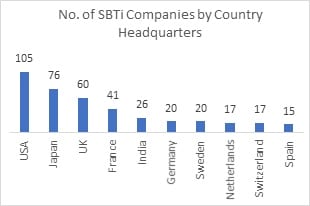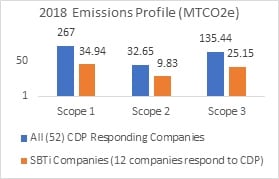
India: A breeding ground for science-based climate action
Apr 23rd 2019
India, along with the rest of the world, is suffering at the hands of increased extreme weather events. From extreme flooding in Kerala in 2018 and Mumbai in 2017 to cyclones battering the east coast, India’s vulnerability to climate change is evident.
Recognising the adverse effects of climate change, the Indian government – under the Paris Agreement – has committed to reduce its emissions intensity of GDP by 33%–35% by 2030, on 2005 levels.
To reach these aims the government has also committed to increase its share of renewable energy, as well as increase the forest cover in the country.
Increasing corporate action
It is not only at the government level that we are seeing climate pledges. Across the country we are seeing an increasing number of companies stepping up – setting bold targets to reduce their emissions in line with that the science says as it is necessary to hold of the worst impacts of climate change.
Meanwhile, as they look to align their business strategies with climate science, many are signing up to other ambitious global initiatives such as RE100 (for renewable energy), EV100 (for electric vehicles) and EP100 (for energy productivity).
The growth of science-based targets in India
Spearheaded by a global challenge for companies to commit to set a science-based target (SBT) – fronted by Anand Mahindra, Chairman of the Mahindra Group, Indian companies have been at the forefront of the global move towards science-based climate action in the last 12 months.

The graph shows the top 10 countries from which companies have committed to the Science Based Targets initiative (SBTi). As of April 2019, 27 Indian companies have committed to this bold initiative, propelling India to fifth position after US, Japan, UK, France in corporate climate action.
Of the companies committed to set SBTs, automobiles and components are the most represented sector, followed by mining – metal and real estate, in India.
And of the 27 committed companies, four have now undergone a rigorous process of having their targets validated by the initiative, including Hindustan Zinc Limited, Mahindra Sanyo Special Steel, Tech Mahindra and Wipro.
The first steel company in the world to have an approved SBT, Mahindra Sanyo Special Steel understands the imperative to act. Combating climate change is among today’s most urgent global challenges, and also one of our biggest economic opportunities,” says Uday Gupta, Ex-Managing Director, Mahindra Sanyo Special Steel. “, we also future-proofing our growth and profitability by taking climate action in collaboration with our partners in the value chain. Science-based targets provide us with a clear road map for such an action plan.”
From commitment to action
Companies with science-based targets are leading the way in the global transition to a zero-carbon economy, and as CDP data show, they have significant emissions potential.

For example, of those companies responding to CDP (52), 12 of these have now committed to the SBTi. These companies represent some 13% of scope 1, 30% in scope 2 and 19% in scope 3 emissions when compared to the total CDP India sample.
It is those companies from the ‘hard to abate’ sectors – such as construction materials, mining – metals, and automobile and components – which have committed to the SBTi to achieve their climate goals.
As Mahendra Singhi, CEO, Dalmia Cement Group says “The global low-carbon transition is underway, and we are gearing up to unlock innovation and create the sustainable business of the future. The Paris Agreement has shown us the direction of travel. Science-based targets provide the roadmap to navigate the transition and ensure we play our part in delivering on the world’s low-carbon goals.”
As they look to achieve their ambitious climate targets, these companies are looking for initiatives to aid their journey. In fact, 95% of India’s responding companies are part of active emission reduction initiatives. The companies are looking to increase their share of renewable, with some 17 companies reporting a target for clean energy uptake. In addition, major Indian businesses such as Dalmia Bharat, Hatsun Agro Products, Infosys, Mahindra Holidays and Tata Motors have committed to using 100% renewable electricity in their global operations by joining the RE100 initiative.
Driving greater ambition
As shown by the Intergovernmental Panel on Climate Change’s (IPCC) special report on 1.5C, urgent action will be required to hold of the disastrous impacts of climate change that await.
The warning is clear: climate change will “disproportionately affect disadvantaged and vulnerable populations through food insecurity, higher food prices, income losses, lost livelihood opportunities, adverse health impacts, and population displacements”.
It should act as a wake-up call for both government and corporates, that they must immediately move towards a zero-carbon pathway.
Originally posted at cdp.net